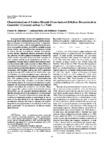Characterization of Carbon Dioxide Stress-Induced Ethylene Biosynthesis in Cucumber {Cucumis sativus L.) Fruit

View/
Date
1998Author
Mathooko, Francis M.
Inaba, Akitsugu
Nakamura, Reinosuke
Metadata
Show full item recordAbstract
In the present study, we have investigated the mechanism through which carbon dioxide induces ethylene biosynthesis in cucumber {Cucumis sativus L.) fruit. A series of inhibitors were tested in order to determine the involvement of de novo protein synthesis, new mRNA synthesis, protein kinase activity, and phosphoprotein phospbatase activity in carbon dioxide stress-induced ethylene biosynthesis. Carbon dioxide stimulated ethylene production through the induction of both 1-aminocyclopropane-l-carboxylate (ACC) synthase and ACC oxidase activities. Induction of ACC synthase activity led to accumulation of ACC. Cycloheximide blocked carbon dioxide stress-induced ethylene biosynthesis while cordycepin had no effect. Dibucaine and 6-dimethylaminopurine, inhibitors of protein kinases, blocked carbon dioxide stress-induced increases in ethylene production, ACC synthase activity, and ACC content but not the increase in ACC oxidase activity. Cantharidin, a potent inhibitor of protein phosphatase type 1 and type 2A, stimulated carbon dioxide stress-induced ethylene production, ACC synthase activity, and ACC accumulation but had no additional effect on carbon dioxide stress-induced ACC oxidase activity. In the presence of dibucaine or cycloheximide, the stimulation of carbon dioxide stress-induced ethylene biosynthesis by cantharidin was blocked. These data suggest that carbon dioxide stress-induced ethylene biosynthesis may be regulated posttranscriptionally and that the induction involves the synthesis of novel protein(s) in the cytosol. The results further identify protein phosphorylation and dephosphorylation as requirements in one or more of the steps involved in the carbon dioxide signal transduction pathway that leads to induction of ethylene biosynthesis and, in particular to the induction of ACC synthase, presumably the key enzyme in the ethylene biosynthetic pathway
